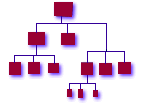


|

|
|
home | sitemap | abstract | introduction | chaos | thinking | checklist | migrating | recovery pushpull | cost | career | workshop | isconf | list_and_community | papers | references |
Ad Hoc Change Tools
Push-based ad hoc change tools such as r-commands and expect scripts are detrimental to use on a regular basis. They generally cause the machines in your infrastructure to drift relative to each other. This makes your infrastructure more expensive to maintain and makes large-scale disaster recovery infeasible. There are few instances where these tools are appropriate to use at all. Most sysadmins are far too familiar with ad hoc change,
using rsh, rcp, and rdist. We briefly debated naming this
document "rdist is not your friend." If we ever write a book
about enterprise infrastructures, that will be the title of
one of the chapters. Many will argue that using ad hoc tools
We found that the routine use of ad hoc change tools on a functioning infrastructure was the strongest contributor towards high total cost of ownership (TCO). This seemed to be true of every operating system we encountered, including non-UNIX operating systems such as Windows NT and MacOS. Most of the cost of desktop ownership is labor [gartner] , and using ad hoc change tools increases entropy in an infrastructure, requiring proportionally increased labor. If the increased labor is applied using ad hoc tools, this increases entropy further, and so on -- it's a positive-feedback cycle. Carry on like this for a short time and all of your machines will soon be unique even if they started out identical. This makes development, deployment, and maintenance of applications and administrative code extremely difficult (and expensive). Ordinarily, any use that we did make of ad hoc tools was simply to force a machine to contact the gold server, so any changes which did take place were still under the gold server's control. After you have done the initial image install on 300 clients and they reboot, you often find they all have some critical piece missing that prevents them from contacting the gold server. You can fix the problem on the install image and re-install the machines again, but time constraints may prevent you from doing that. In this case, you may need to apply ad hoc tools. For instance, we usually used entries in our machines' rc.local or crontab, calling one or two executables in /usr/local/bin, to trigger a contact with the gold server (via NFS or SUP) on every boot. If any of this was broken we had to have an ad hoc way to fix it or the machine would never get updates. Since the "critical piece missing" on newly installed hosts could be something like /.rhosts or hosts.equiv, that means rcp, rsh, or ssh can't be counted on. For us, that meant 'expect' [libes] was the best tool. We developed an expect script called 'rabbit' [rabbit] which allowed us to execute arbitrary commands on an ad hoc basis on a large number of machines. It worked by logging into each of them as an appropriate user, ftp'ing a small script into /tmp, and executing it automatically. Rabbit was also useful for triggering a pull from the gold server when we needed to propagate a change right away to hundreds of machines. Without this, we might have to wait up to an hour for a crontab entry on all the client machines to trigger the pull instead. |
|
||||||||
|
© Copyright 1994-2007 Steve
Traugott,
Joel Huddleston,
Joyce Cao Traugott
In partnership with TerraLuna, LLC and CD International |
||||||||